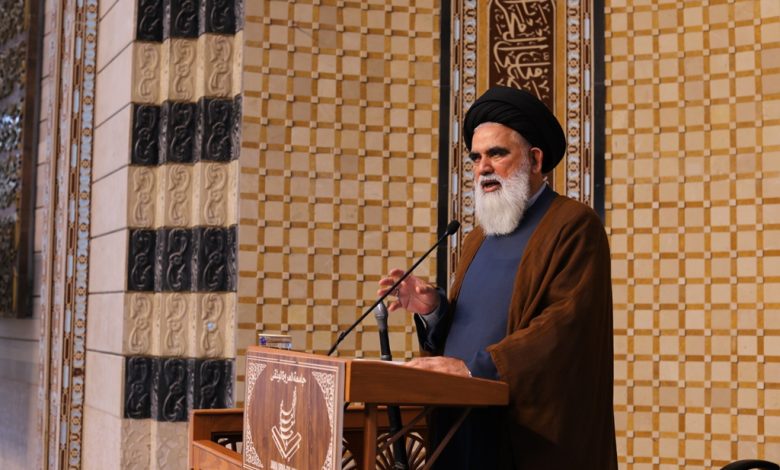
Hujjatul Islam Ustad Syed Jawad Naqvi
(Principal Jamia Orwatul Wuthqa – Lahore)
Delivered at: Masjid Baitul ul Ateeq
Lahore – Pakistan
Friday Sermon 11th April – 2025
Sermon 1 : How Fitnah gets born and spread in words of Imam Ali (a)
Sermon 2: Extreme hatred and enmity of Imams (a) towards Ghaali’s
Fitnah (trial, turmoil, or sedition) is like a raging fire that consumes everything in its path. Though a social fitnah may not cause physical harm—just as stones remain unburnt during a fire—it doesn’t mean damage hasn’t been done. In times of fitnah, people with hardened hearts, described in the Quran as more rigid than stone, remain unaffected externally. They continue to enjoy life, but their inner humanity has been consumed and destroyed by the flames of fitnah.
Throughout human history, no era has been completely free from fitnah, and this was especially true during the time of Amirul Momineen (a), whose entire struggle was directed at confronting and resisting these trials. Those same fitnahs still exist today. Modern scholars and sociologists unanimously agree that our present era is surrounded by intense and widespread fitnahs, with destructive consequences that will extend far into future generations.
When a community succumbs to fitnah, its destructive effects become generational. Our current generation is suffering not only from the fitnahs inherited from the past but also from new ones unique to this time. One major fitnah in the Indian subcontinent was the colonial dominance of the British. Although colonial rule has ended, its cultural and psychological effects persist in India, Pakistan, Bangladesh, and Sri Lanka—and will likely remain for generations to come. This fitnah has left behind ruins and a deep-rooted legacy that many have now internalized and accepted, making it even more difficult to escape its grasp.
The Quran provides clear guidance for protection against fitnah, and outlines a specific system of defense in Surah Al-Anfal, verse 25, which serves as a divine prescription for safeguarding individuals and communities against such destructive.
يَا أَيُّهَا الَّذِينَ آمَنُوا اسْتَجِيبُوا لِلَّهِ وَلِلرَّسُولِ إِذَا دَعَاكُمْ لِمَا يُحْيِيكُمْ ۖ وَاعْلَمُوا أَنَّ اللَّهَ يَحُولُ بَيْنَ الْمَرْءِ وَقَلْبِهِ وَأَنَّهُ إِلَيْهِ تُحْشَرُونَ {24}
O you who believe! answer (the call of) Allah and His Messenger when he calls you to that which gives you life; and know that Allah intervenes between man and his heart, and that to Him you shall be gathered.
وَاتَّقُوا فِتْنَةً لَا تُصِيبَنَّ الَّذِينَ ظَلَمُوا مِنْكُمْ خَاصَّةً ۖ وَاعْلَمُوا أَنَّ اللَّهَ شَدِيدُ الْعِقَابِ {25}
And fear an affliction which may not smite those of you in particular who are unjust; and know that Allah is severe in requiting (evil).
The Quran warns that fitnah (trial or sedition) often arises as a result of the oppression carried out by tyrants, but its impact is not limited to the oppressors alone. It engulfs everyone—the believers, the righteous, and the oppressed alike. As Imam Ali (a) states, fitnah is blind; it does not distinguish between friend or foe, oppressor or innocent. Just like fire does not discriminate between the trees it burns, fitnah destroys everything in its path. This is the inherent nature of both fire and fitnah—to consume all who come under their influence.
The Quran commands: “Ittaqu fitnatan”—“Protect yourselves from a fitnah”—warning that this is not a danger reserved only for tyrants. Therefore, no one should become complacent; everyone is vulnerable.
The era of Imam Ali (a) was one filled with widespread seditions and fitan (plural of fitnah). These did not originate from within his own rule but emerged as a result of Muslims abandoning the teachings of the Holy Prophet (s). Once divine guidance was neglected, fitnah crept in and began to dominate. Despite Imam Ali’s (a) unmatched stature as a leader—second only to the Prophet (s) himself—even his leadership could not entirely shield the community. According to Islamic traditions, the only other truly just and divine government after that of Ali (a) will be the awaited rule of Imam Mahdi (a.t.f.s).
In Sermon 149 of Nahjul Balagha, Imam Ali (a) foretells:
“You will soon face a great fitnah.”
He warns that to remain safe during such trials, one must detach from the intoxication of excessive bounties (ni‘mah). Many people become mentally clouded by wealth, comfort, or even status. In such a state of intoxication, a person loses clarity, judgment, and the ability to make sound decisions. These bounties, while seemingly blessings, can lead to spiritual lethargy and loss of purpose. Imam Ali (a) cautions that both deprivation and overabundance can be destructive. Whether one has too little or too much, one must remain grounded in human values and spiritual awareness.
He offers two striking examples:
– The poor, who say, “We have nothing—why should we attend Friday prayers?”
– The wealthy, who say, “We have other priorities—our shop is open, our car is being serviced, or guests are visiting.”
In both scenarios, the connection to divine responsibility is lost.
Thus, taqwa (God-consciousness) is essential—not just in the traditional, moralistic sense of avoiding sin—but as a tool for navigating and surviving the turbulence of fitnah. Imam Ali (a) calls for taqwa against the intoxication of comfort, and resilience in the face of deprivation. One should neither become arrogant through luxury nor despondent through hardship.
He continues:
“When darkness surrounds you to the point that right and wrong become indistinguishable—develop firmness (ṣabāt).”
This steadfastness is what anchors the soul amidst chaos.
Imam Ali (a) also provides a powerful metaphor for how fitnah is born: just like a child is conceived through the union of man and woman, and then develops silently in the womb before its birth, so too does fitnah begin quietly and grow unnoticed. Its initial phase is concealed (jinān), but when it is born, it establishes its pole of attraction (Axel), drawing people around it and disrupting societies.
The seed of fitnah is planted as a corrupt thought—an evil idea that first arises in the mind of a person with a devilish nature. Like a seed of mischief, it is then passed on to companions, followers, or students. This is how fitnah begins to spread. For example, sectarianism may take root in the mind of a teacher who later transmits it to his students or propagates it on social media. Once it finds an audience, it begins to grow and mature.
At its early stage, every fitnah develops around a central axis, and gradually an orbit forms around that axis—a system through which the fitnah revolves and entraps people. This is the moment of caution: when the orbit of fitnah is forming, people must be vigilant. If ignored, once it has fully formed and gained momentum, fitnah becomes almost impossible to stop.
Initially hidden, fitnah moves silently through various phases, growing stronger at each step. Its corrupt consequences begin to surface slowly, until eventually, its filth and destruction become public and widespread. At this point, fitnah reaches its youthful stage—strong, aggressive, and independent. No longer fragile, it now becomes a tool for tyrants and oppressors.
Often, fitnah is born in a religious school (madrassa), sect, group, pulpit, or even parliament. Once it matures, it is inherited and weaponized by oppressors. The first oppressor becomes the pioneer and standard-bearer of the fitnah, and later tyrants follow his path. These groups of oppressors fight among themselves, driven by the pursuit of power through corruption. They ride on the back of fitnah, dividing into ever-smaller factions. Each faction forms its own leadership, and rivalry follows—leading to slander, character assassination, and mutual hatred. When they meet, their interaction is filled with curses and hostility.
Human societies are like fertile lands, capable of nurturing whatever is sown in them. Tragically, the land of Pakistan today has become extremely fertile—not for wisdom, reform, or progress—but for fitnah. Try to sow knowledge and understanding, and it withers. But sow a seed of sedition, foolishness, or sectarianism, and it multiplies manifold.
Whether it’s politics, religious institutions, or educational systems, fitnah has infiltrated every corner. Consider this: while a law is passed in schools prohibiting female teachers from wearing jeans, the same government’s information ministry conducts raids on cinema halls showing vulgar content. Meanwhile, in universities and colleges, illicit relationships flourish—between students and even between students and faculty. These behaviors aren’t part of the curriculum, yet they thrive. Why? Because the social environment is ripe for moral decay.
Imam Ali (a) says:
“Fitnah makes room only for more fitnah, not for guidance, knowledge, or growth.”
One type of fitnah gives birth to another. A religious sedition inevitably leads to political turmoil. Corruption in one place spreads across the society. Just like wild plants that grow without being planted—scattered by the wind—fitnah spreads in the same way. The seeds of fitnah blow through mosques, social media, and public platforms, and people rush to embrace it. Speak about chaos, slander, or scandal—you’ll get likes, views, and followers. But speak of education, self-reform, or spiritual development, and you’ll be ignored.
Their hearts have become fertile ground for fitnah. So, how can it be stopped?
The answer lies in taqwa—deep, unwavering God-consciousness. It is the only effective shield against the storms of fitnah. We will continue by reflecting further on the guidance of Imam Ali (a) on how to protect ourselves from these devastating trials.
.
SERMON 2
Imam Ali presented the threat from Fitnah’s of Kuluw and Ghuluw.
.وَ قَالَ عليه السلام: هَلَكَ فِيَّ رَجُلَانِ مُحِبٌّ غَالٍ وَ مُبْغِضٌ قَالٍ
Two categories of persons will face ruin on account of me: he who loves me with exaggeration, and he who hates me intensely
Ghuluw (extremism in religion) is a dangerous fitnah that has consumed the current generation—especially within the Pakistani nation, which is afflicted by both Ghuluw and Nasibiyat (hatred towards the Ahlulbayt a.s.). While in the past, Nasibis openly cursed Imam Ali (a), today they operate more subtly: instead of attacking Ali (a) directly, they glorify and promote the enemies of the Ahlulbayt (a). This indirect method of spreading hatred is a growing threat within Pakistani society.
Ghuluw: A Termite Eating into Shiism
While Nasibiyat targets the identity of Shiism from outside, Ghuluw threatens it from within, like a termite eating away the foundations of the faith. For this reason, the Imams (a) took a strong and uncompromising stance against the Ghulat (extremists who elevate the status of Imams to divinity or exaggerate their traits beyond what is Islamic).
There is a narration in which a group came to Imam Ali (a), sending salutations and calling him “our Lord.” Imam Ali (a) immediately rebuked them and told them to seek forgiveness. But when they insisted, saying, “This is our belief,” Imam Ali (a) ordered a pit to be dug, lit a fire in it, and cast them into it himself—such was the severity of their deviation. This extreme punishment was not given to any other group, highlighting how dangerous and destructive the ideology of Ghuluw truly is.
Tradition from Imam Rida (a): Refuting Ghuluw and Tafwidh
In the 10th tradition on Ghuluw from Allama Majlisi’s Bihar al-Anwar, Imam Rida (a) states:
“Anyone who believes Allah resembles His creation is a mushrik (polytheist) and a kafir (disbeliever). Those who claim that man’s every action is predestined by Allah are also disbelievers. We distance ourselves from such people in this world and the Hereafter. They are not our followers, and we are not their Imams.”
Imam Rida (a) clearly explains that the traditions falsely attributing shirk (association with Allah) and predestination to the Imams were fabricated by Ghulat in an attempt to tarnish the image of the Imams. These fabrications are still used to attack and discredit Shiism.
One narrator said to Imam Rida (a): “Others accuse us of such beliefs.” This prompted a powerful response from the Imam, making it clear that loving the Imams is not enough—one must also adhere to their guidance and beliefs, not merely express admiration while opposing their principles in practice.
Imam’s Warning to the Shia About Ghulat
Imam Rida (a) provides sharp, clear directives:
• One who loves the Ghulat hates the Imams.
• Whoever befriends a Ghali has severed their connection with the Imams.
• Whoever honors a Ghali has insulted the Imams.
• Supporting or showing kindness to Ghulat is equivalent to oppressing the Ahlulbayt.
• Only those who disassociate from the Ghulat can claim true loyalty to the Imams.
These statements make it unambiguously clear that the Ghulat are not just misguided but actively harmful to the cause of the Ahlulbayt (a). This tradition has been recorded for over a thousand years in works like Uyoon Akhbar al-Ridha by Sheikh Saduq, yet it is rarely mentioned from modern pulpits.
A Letter from Imam Mahdi (a.t.f.s) on Ghuluw
In Hadith 9, a letter attributed to Imam Mahdi (a.t.f.s) was sent to one of his representatives, Muhammad ibn Ali. The Imam (a) wrote:
“O Muhammad ibn Ali! Allah is far above the attributes people falsely assign to Him. Inform our Shias not to associate anyone with Allah in power or knowledge. The knowledge of the unseen (ghayb) belongs solely to Allah. All Prophets and Imams—from Adam to my own era—are servants of Allah, not His partners.”
The Imam continues, expressing deep sorrow and pain caused by ignorant Shias who claim divine attributes for the Imams or assert their participation in Allah’s lordship or creation.
“I bear witness before Allah that I disassociate from those who say the Imams have knowledge of the unseen like Allah. Those who elevate us beyond our divinely assigned status have separated themselves from us and from Allah.”
The letter concludes with a powerful instruction:
“This letter is a trust upon your shoulders and upon all who hear or read it. Do not conceal it—make sure it reaches our Shias. Keep broadcasting this message until all our followers return to the true Tawheed (monotheism) that we and our forefathers upheld. If someone conceals this message or does not act upon it, he will be cursed by Allah and the righteous.”
Final Reflections
This letter from the Imam of our age (a.t.f.s) makes it clear that Ghuluw is a catastrophic fitnah—one that destroys the very foundation of Shiism. The Imams used stern language and strict action against Ghulat for a reason: their beliefs distort monotheism, defame the Imams, and mislead the weak-hearted among the Shia.
Today, sadly, the Ghulat have taken center stage in some Shia gatherings. They misrepresent the faith and turn the pure love of Ahlulbayt into idolatrous exaggeration. Therefore, it becomes an obligation for every sincere follower of the Ahlulbayt to stand against Ghuluw, educate others about its dangers, and return to the balanced path of Tawheed and Wilayah as taught by the Imams themselves.
.




